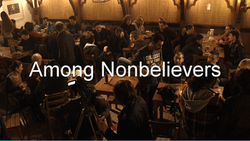Among Nonbelievers
Among Nonbelievers (Dutch title: Onder Ongelovigen) is a 2015 bilingual English–Dutch documentary on the situation of endangered nonbelievers, especially ex-Muslims, around the world. Set in the United Kingdom, Turkey, the Netherlands and Switzerland, the film is directed by Dorothée Forma and produced by HUMAN with the support of the Dutch Humanist Association.[1] In 2016, it was succeeded by Non-believers: Freethinkers on the Run, which dealt with the fate of apostates and freethinkers in Dutch refugee camps.[2]
| Among Nonbelievers | |
|---|---|
 | |
| Dutch | Onder Ongelovigen |
| Directed by | Dorothée Forma |
| Country of origin | Netherlands |
| Original language(s) | Dutch English |
| Production | |
| Running time | 53 minutes |
| Distributor | HUMAN |
| Release | |
| Original release | 2 September 2015 |
| Chronology | |
| Followed by | Non-believers: Freethinkers on the Run |
| External links | |
| Website | |
Synopsis
Boris van der Ham, president of the Dutch Humanist Association, meets up with ex-Muslims in different countries, listens to their stories and discusses with them what should be done about their situation.[3] First, he visits the Istanbul-based office of Ateizm Derneği, an association that serves the interests of atheists, who are regularly threatened, harassed and discriminated in Turkey.[4][5] Religion is also exploited by president Recep Tayyip Erdoğan's AKP government as an economic power tool, some activists explain in Istanbul.
Next, Van der Ham attends the Secular Conference 2014 in London,[6] organised by the Council of Ex-Muslims of Britain led by Maryam Namazie, where 'secular thinkers, filmmakers and experts convene to raise awareness about the problems experienced by nonbelievers.' There, regular calls are made on Western and European humanists to show more solidarity and dedicated to the rights of nonbelievers outside the Western world. Sudanese ex-Muslim Nahla Mahmoud was targeted by an Islamist hate campaign after she criticised British sharia courts.[7] She rebuked the regressive left attitude of some Westerners who dismiss any kind of criticism of Islam as 'islamophobia', and ignore Islamic intolerance in the spirit of 'multiculturalism'.[6] An extra danger is that the far-right will hijack the debate on Islam if the left is too afraid to say anything.[6] Richard Dawkins adds that many liberal critics of Islam fear being called 'racists', even though Islam is not a 'race', and that liberals have the duty to advocate for women's rights and freedom of expression.[8]
Van der Ham also goes to Glasgow for conversations with the Ex-Muslims of Scotland,[1] who are threatened and discriminated against by members of their own family, and cannot return to their country of birth, where they face the death penalty for apostasy or blasphemy.[note 1] He discusses the Charlie Hebdo shooting with Theodor Holman. Together with other Dutch humanists and freethinkers, Van der Ham marches through The Hague to demand freedom of thought. They offer copies of the 2015 Freedom of Thought Report to ambassadors of a number of countries where nonbelievers are being persecuted and oppressed; he conducts a conversation with the Iraqi ambassador. The report is also received in the Dutch House of Representatives by the House Commission of Foreign Affairs.[10] Elizabeth O'Casey, IHEU representative at the United Nations, explains how Muslim-majority countries internationally always invoke the argument of 'defamation of religion' to continue to violate the human rights of their citizens. Finally, Van der Ham holds a plea for freedom of thought against religious intolerance at the United Nations Human Rights Council in Geneva.
Cast
- Paul Cliteur (former president of the Dutch Humanist Association)
- Richard Dawkins, British scientist and atheist activist
- Nadia El Fani (from Tunisia), film director of Neither Allah nor Master
- Ramin Forghani (from Iran), founder of Ex-Muslims of Scotland
- Boris van der Ham (president of the Dutch Humanist Association)
- Theodor Holman, Dutch television host
- Nahla Mahmoud (from Sudan), spokesperson for the Council of Ex-Muslims of Britain
- Maryam Namazie (from Iran), president of the Council of Ex-Muslims of Britain
- Pieter Omtzigt (CDA), vice-president Dutch House Commission of Foreign Affairs
- Elizabeth O'Casey, IHEU UN human rights delegation chief
- Şafak Pavey, Turkish MP (CHP)
- Onur Roman, Mehmet Emin Üçbağla, Kaan Hatunoğlu, Tolga İnci and several other members of Ateizm Derneği (in Turkey)
See also
Notes
- In 2009, during his tenure as Member of Parliament, Van der Ham took the initiative of abolishing the Dutch law against blasphemy, which was finalised in 2014.[9]
References
- "2Doc: Onder ongelovigen". NRC Handelsblad. 2 September 2015. Retrieved 1 October 2017.
- "Ongelovig: vrijdenkers op de vlucht NPO 2, 22.55-23.50u". NRC Handelsblad. 12 December 2016. Retrieved 30 September 2017.
- Gert Jan Geling (13 September 2015). "Emancipatiestrijd van ex-moslims is hard nodig". ThePostOnline. Retrieved 1 October 2017.
- "Ateizm Derneği'ne panik butonu". Hürriyet (in Turkish). 5 May 2014. Retrieved 18 September 2017.
- Daniela Wakonigg (17 June 2017). ""Es sollte keinen Mut erfordern müssen, Atheist zu sein"". Diesseits (in German). Humanistischer Pressedienst. Retrieved 18 September 2017.
- Ruben Gischler (28 August 2015). "Onder Ongelovigen (interview met Boris van der Ham)". Opiniez. Vimeo. Retrieved 1 October 2017.
- Hussein Kesvani (17 October 2013). "Leaving Islam Behind Is a Scary Prospect for Britain's Ex-Muslims". Vice News. Retrieved 1 October 2017.
- Richard Dawkins (11 July 2015). "Richard Dawkins Responds to Ben Affleck". C-SPAN2. Retrieved 1 October 2017.
- Ekke Overbeek; Alwin Kuiken; Antoine Verbij; Thijs Kettenis; Kleis Jager (14 January 2015). "In Europa kun je veel zeggen, maar niet alles". Trouw. Retrieved 2 October 2017.
- Gerrit-Jan Kleinjan (10 December 2015). "Atheïst staat wereldwijd bloot aan discriminatie of erger". Trouw. Retrieved 1 October 2017.